MSPs looking for the Produce8 Playbook, look no further!
Great Workdays Kickoff for Organizations
Goal
Transform Culture
Duration
30 Days
Technique
Organization
Measurement
Want to have better workdays? We can help!
Join newsletterWelcome to Produce8’s Great Workdays Kickoff for Organizations! This program is for leaders and teams looking to create a better work environment. The goal is to identify how big the collaboration problem is in your workspace.
Over the next four weeks, this challenge will lead your team through a clear process to understand how work collaboration technology impacts their productivity and digital well-being. By the time you’re finished, you'll know what's effective and what needs improvement, allowing you to make changes and save time during the workday.
Next, you'll begin tackling collaboration distractions through a challenge that everyone in the company can participate in.
Challenge Guidelines:
- Get set up: Log in to Produce8 and connect the product with your daily work tools. This setup will help you measure your activities across different applications and gain detailed insights into your work habits.
- Send an invite to your team with a shareable link: Produce8 will provide you with an email to send to your team. This will include a link to get them set up in Produce8 quickly.
- Address the why: The goal of the kickoff is to align the whole organization around an intention to have healthier and more productive workdays. We do this by measuring the impact of collaboration and tech so your organization can recover focus time and reduce overwork.
- Measure the workday: Now that managers, executives, and team members are using Produce8, continue working as usual. After 30 days, you'll have enough data to understand how work occurs in your organization. You can find this information in Account Metrics, which we'll cover next.
How the Great Workdays Kickoff for Organizations Works:
The Great Workdays Kickoff for Organizations focuses on collecting data about your business's work habits. Doing so will help you understand how collaboration affects the workday. Let's dive into the kickoff by analyzing it from a week-by-week process.
Setup Phase: Week 1
- Account owner adds main business and collaboration apps
- Users set up their own workspaces
Assign a leader: The challenge requires a leader. This can be either a manager, executive, or someone else in the organization. You might also receive help from an MSP or a productivity consultant. (If you're reading this, you are probably the right person!)
Send an open invite: To get everyone in the organization involved, the leader will send an open invitation to all employees. We suggest creating a sign-up link in Produce8 and including an email along the lines of:
SAMPLE EMAIL
Hi team!
We believe we’ve identified a huge problem within our organization. It’s impacting your work, leading to longer workdays, and negatively affecting everyone’s well-being. We are at the mercy to constant emails and direct messaging, excessive meetings, and context switching. All of this is ruining everyone’s ability to focus and get work done!
But we’ve got a way to fix things. Allow us to introduce a fantastic new tool, Produce8. Produce8 is a digital work analytics platform that can help individuals and organizations combat the distractions of the workday by understanding how we work together. We want to extend an invitation to all employees who spend their days in front of screens to sign up to Produce8. We will host a brief call for anyone wishing to participate soon. Stay tuned.
Thank you!
Team buy-in: Introduce the kickoff and the goals associated with it in a meeting or a recorded video. Explain the importance of understanding both individual and team work habits to improve collaboration.
Produce8 will generate insights by gathering data from tools like video calls, messaging, email, and other business apps. Employees can add their own tools and data sources as well.
Employees control the data they share, meaning privacy and security concerns are addressed. They don't have to include interactions with non-work apps or browsers, and they can keep personal data private in their Produce8 workspaces.
Check-in on progress, sign-ups, and extensions: To make sure data is being collected, we must check that team members have connected their accounts properly. Go to Account Health to see if Extensions and Apps are linked. If you have any questions, contact our Customer Success Team.
Work Phase: Week 2-3
Let Produce8 go to work: For the next two weeks, let the team work as they typically do while Produce8 gathers insights in the background. This will help identify inefficiencies such as too many meetings or broken workflows. As employees continue working, you'll receive aggregated and anonymized insights in the Organization Account Summary.
Analysis Phase: Week 4
Prepare for the next step: Summarize the key insights from the challenge. Identify common habits, recurring issues, and ideal work periods. Highlight examples that show how changes in work habits can boost productivity and improve collaboration. This summary will provide your organization with a clear picture of what to focus on in the next challenge.
Challenge KPIs:
To understand the current state of collaboration in the organization, check the aggregated data in Account Metrics. As the leader, you can share this information with the team so everyone knows what needs improvement.
Meetings and Virtual Calls
By looking at the Calls and Meetings Metrics, you can see how much time is spent in meetings and identify which meetings are effective.
How much time is the organization spending on internal versus external meetings? How much time are employees dedicating to focused work using time blocking? How much time does the organization spend in virtual calls? This step provides answers to those questions.
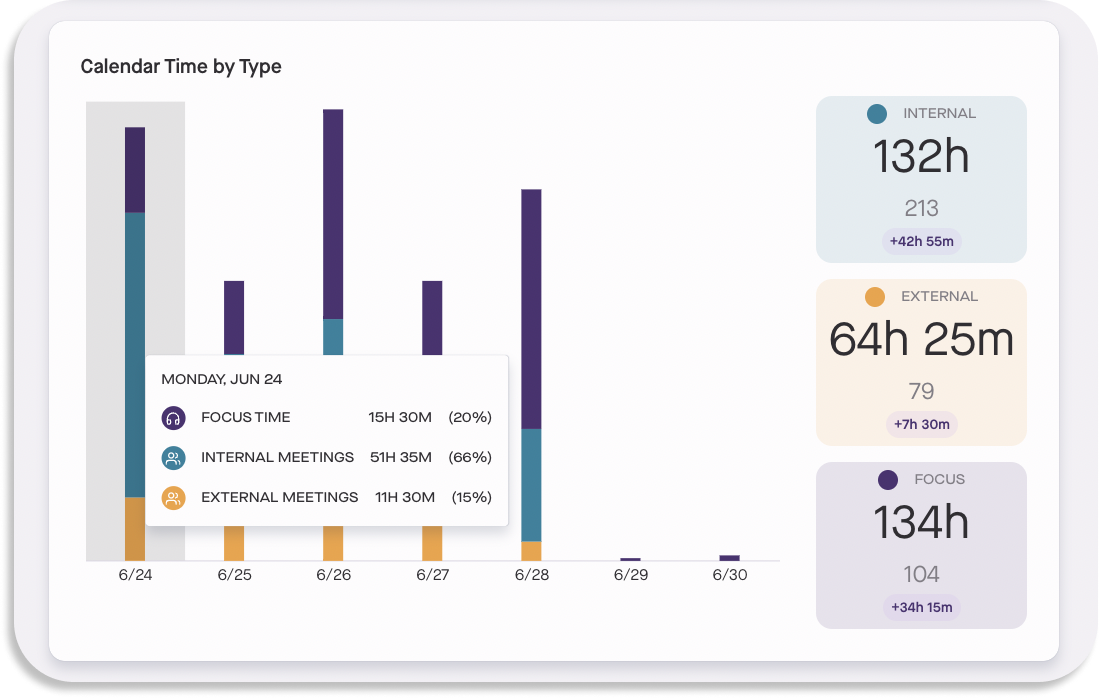
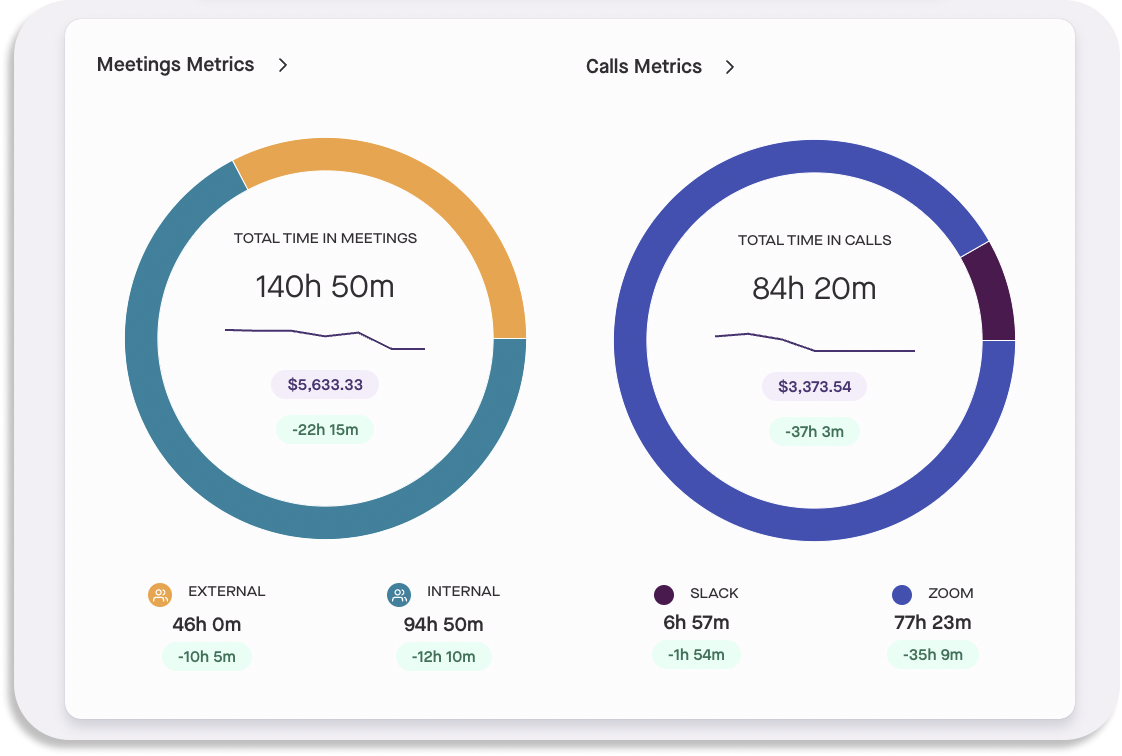
Messaging
How often does the average employee view their messaging tool?
With tools like Slack and Teams, the problem is usually not how much time they spend in an app, but rather how often they check it.
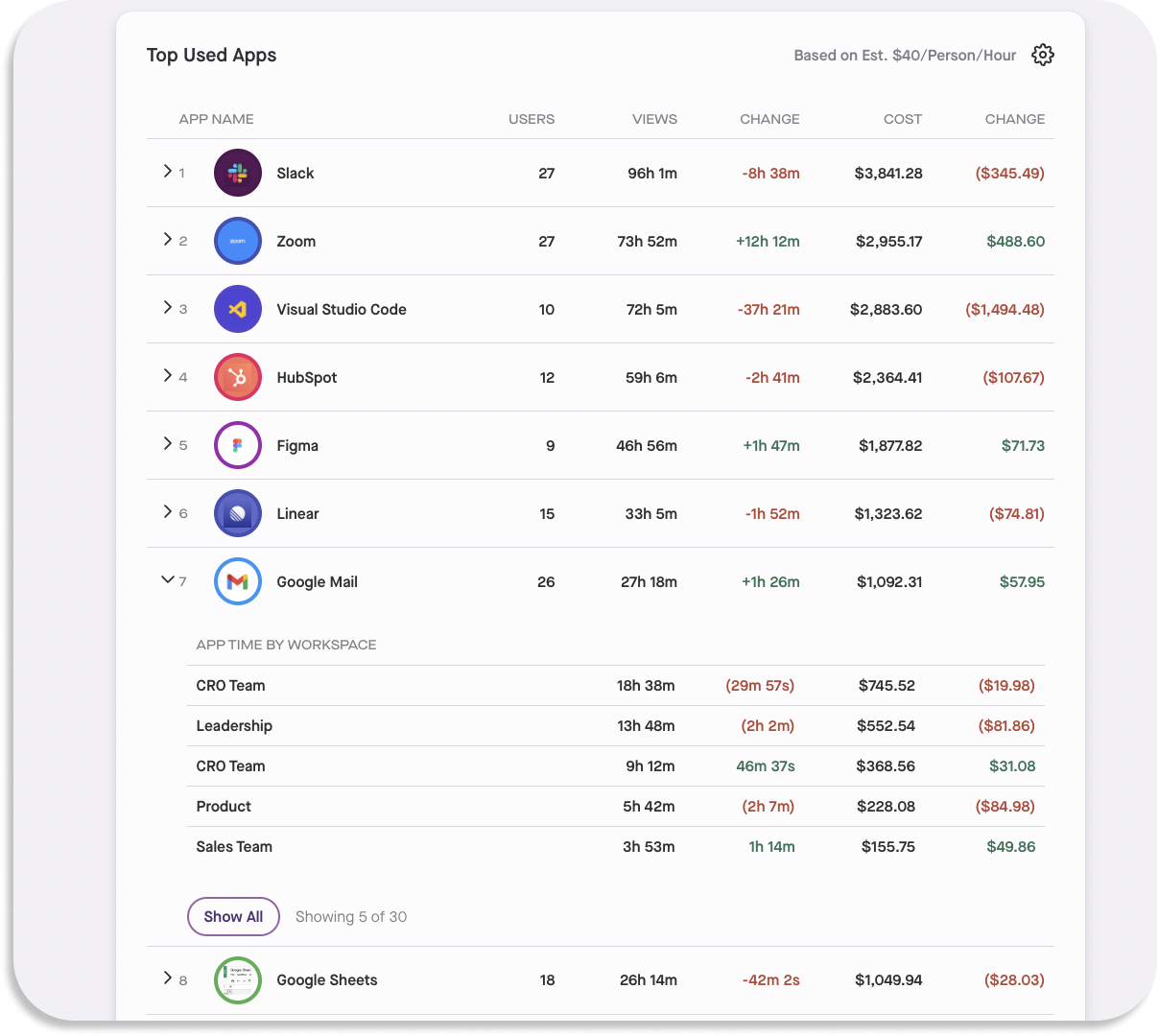
The same issue applies to email. Every time we respond to email notifications, it disrupts our focus and creates costs associated with context switching. So, we must pay close attention to how often we interact with emails.
How often does the average employee open emails per day?
Sentiment
Are employees experiencing the kind of day they intended to have?
The app prompts employees in both the morning and afternoon to share how they feel about their workday. The organization will see anonymized responses to understand how everyone feels. As the organization addresses issues, these responses should become more positive.
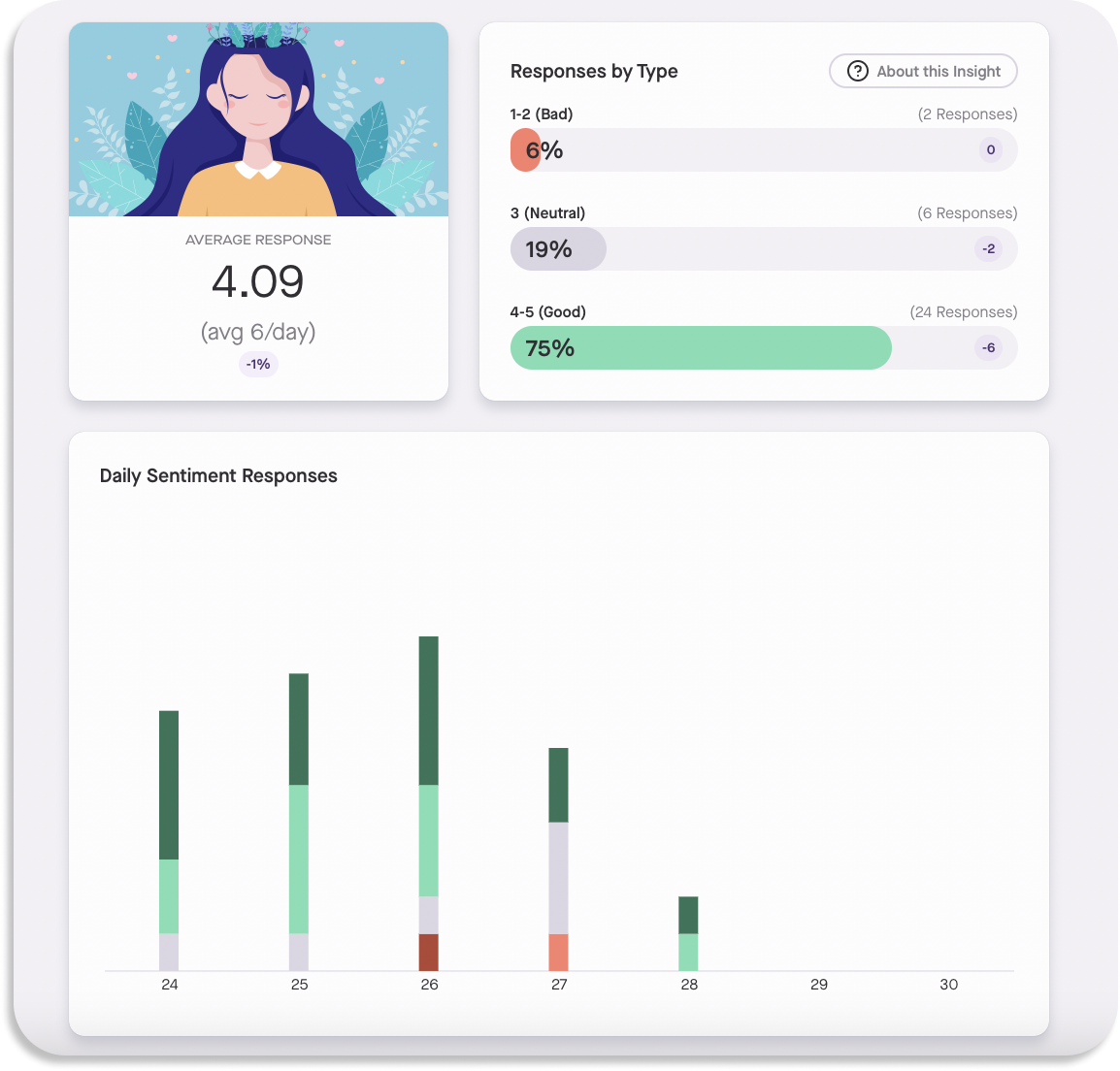
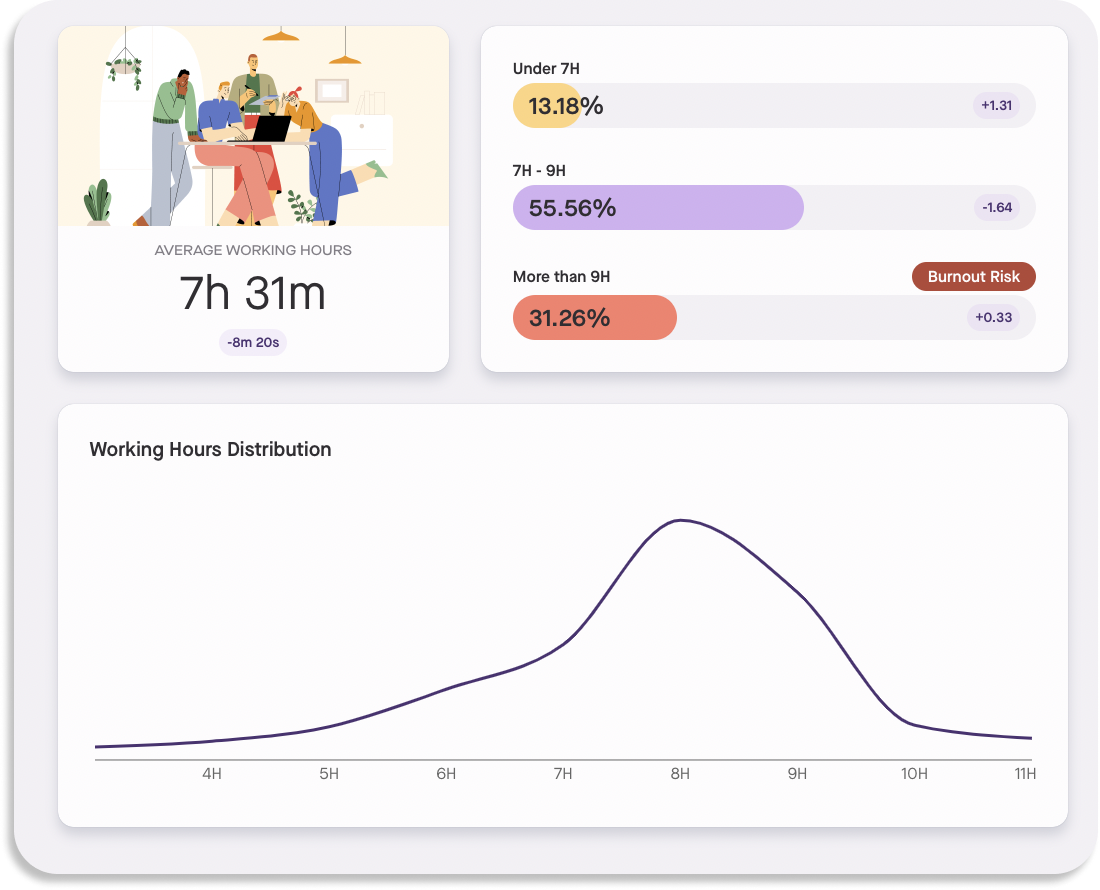
Average Hours Worked
Are employees overworked?
To improve employee well-being, check the average hours employees spend working. Overworking can negatively impact employee wellbeing and lower productivity. If after one month you notice that many employees are working over nine-hour days, it's time to encourage your team to take on well-being challenges.
Top Apps
Is your organization using the right tools? You invest heavily in technology, but the bigger cost is the time spent on tools and their impact on the workday. If expensive apps aren't being used or too much time is spent using ineffective tools, it's time to improve workflows and create more focus hours. Use this data to set goals related to reducing app time or create challenges to enhance focus.
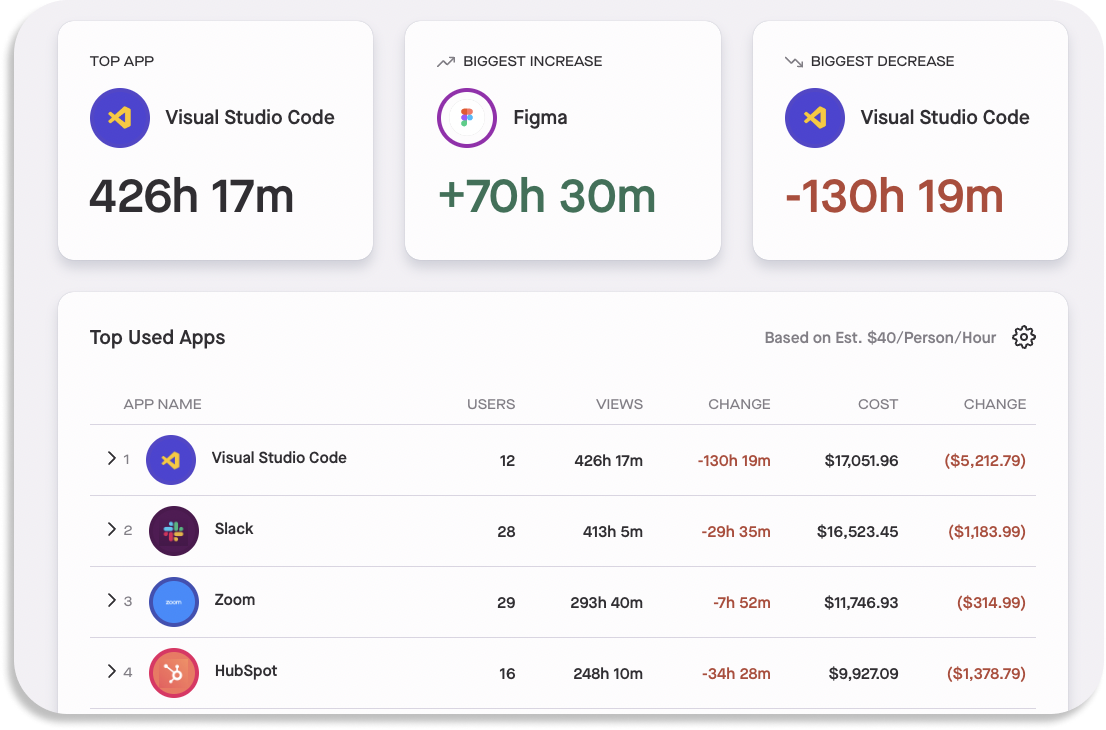
Outcome:
By collecting and analyzing data, your team will gain valuable insights into work habits. They will have identified and fixed collaboration issues, distractions, and inefficiencies. This understanding fosters a collaborative environment in which workers are aligned and committed to common goals.
Next Steps:
After the 30-day kickoff, analyze the data with your team to identify what's holding you back. Issues might include too many meetings, distracting tools, bad digital habits, or overworking. These can be fixed at the individual, team, or organizational level. We recommend addressing them accordingly.